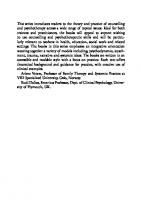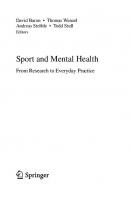Communicating With Families: Taking The Language of Mental Health From Research to Practice (Palgrave Texts in Counselling and Psychotherapy) 3031304179, 9783031304170
This textbook uniquely highlights the particular complexities of working systemically with couples and families with chi
115 73 3MB
English Pages 299 [287] Year 2023
Table of contents :
Foreword
Acknowledgements
Contents
About the Authors
Abbreviations
List of Figures
List of Tables
List of Boxes
Part I: Theoretical Context
1: Systems Within Systems: Families in Society
Introduction
Language and Communication
Stigma
Labelling
Pathology
Social Meta-Narratives
Ecological Systems Theory
Family Systems Theory
The Construction of Reality Within Family Systems
Research Data
About Our Projects
Analytic Approaches
Introductory Examples of Discursive Analysis of Family Systems
Author Positionality
Final Thoughts
References
2: Family Dynamics and Constructs
Introduction
What Constitutes the Family?
The Social Construction of the Family
Sociology of the Child
Vulnerability and Resilience Factors in the Family
Disruption and Resilience
Vulnerability Factors
Working with Families in Mental Health
Final Thoughts
References
3: Forming and Maintaining Good Relationships
Introduction
The Therapeutic Relationship
Establishing and Maintaining Alignment
Language and Active Listening
Alignment Through Professional ‘Gossiping’
Alignment Through Extreme Case Formulation
Rupture
Inattention
Disruption
Resistance
Discontinuity
Pre-empting
Performing
Picking up
Taking Responsibility for Rupture Management
Interruptions
Power and Asymmetry
Members Interrupting: Children
Members Interrupting: Practitioners
Final Thoughts
References
Part II: Engaging Children
4: Designing Questions with Children
Introduction
The Value of Questions and the Importance of Question Design
Different Ways of Using Questions
Closed Questions
Wh-Prefaced Questions
Declarative Questions
Tag Questions
Either/Or Questions
Summarising Thoughts
‘Why Are You Here?’ Questions
Using Why Questions
The Miracle Question
You Said Prefaced Questions
Circular Questions
Final Thoughts
References
5: Using Creative Activities with Children
Introduction
Subjective Units of Distress
Stress Bucket
Using Symbols and Archetypes
A Shift to Digital
Incorporating Creative Approaches Online
Final Thoughts
References
6: Children’s Competence
Introduction
Situated Interactional Competence
The Knowledge Continuum
Institutionally Situated Linguistic Competence
Competence to Report One’s Own Motivations, Feelings and Thoughts
Knowledge of the Feelings and Thoughts of Others
Negotiated Competency Expectations
Final Thoughts
References
Part III: Attending to the Different Needs of Family Members
7: Managing Age-Appropriate Conversations with Children Present
Introduction
Appropriate Topics of Conversation
Talking About the Child, with the Child Present
Negotiating Time with Parents and Children Separately
The Value of Separation
Techniques for Separation
Final Thoughts
References
8: Avoiding Shame and Blame
Introduction
Identity Construction and the Role of the Good Parent
Parent Blaming
Managing Responsibility and Blame
Virtue Signalling and Identifying as a Good Parent
Final Thoughts
References
9: How to Talk About Risk
Introduction
How to Have a Conversation About Risk
Harm to Self
Incremental
Normalising
Harm to Others
Harm from Others
Risk of Harm to Self, Others and from Others Online
Safeguarding
Child Protection
Vulnerable Adults
Confidentiality Breach
Responsibility and Boundaries
Final Thoughts
References
10: Using Naturally Occurring Data for Professional Development
Introduction
Using Recordings of Naturally Occurring Activities
Pragmatics of Recording Conversations with Families
Using Online Modalities
In the Clinic Versus on the Go
Asking the Family to Record Events in the Home Environment
Using Naturally Occurring Text-Based Documents
Clinical Notes
Referral Documents
Progress and Outcome Reports
Using Naturally Occurring Data for Supervision
Using Reflective Interventionist Conversation Analysis (RICA)
Final Thoughts
References
Appendix: Jefferson Transcription – Overview of Symbols Used
Index
Foreword
Acknowledgements
Contents
About the Authors
Abbreviations
List of Figures
List of Tables
List of Boxes
Part I: Theoretical Context
1: Systems Within Systems: Families in Society
Introduction
Language and Communication
Stigma
Labelling
Pathology
Social Meta-Narratives
Ecological Systems Theory
Family Systems Theory
The Construction of Reality Within Family Systems
Research Data
About Our Projects
Analytic Approaches
Introductory Examples of Discursive Analysis of Family Systems
Author Positionality
Final Thoughts
References
2: Family Dynamics and Constructs
Introduction
What Constitutes the Family?
The Social Construction of the Family
Sociology of the Child
Vulnerability and Resilience Factors in the Family
Disruption and Resilience
Vulnerability Factors
Working with Families in Mental Health
Final Thoughts
References
3: Forming and Maintaining Good Relationships
Introduction
The Therapeutic Relationship
Establishing and Maintaining Alignment
Language and Active Listening
Alignment Through Professional ‘Gossiping’
Alignment Through Extreme Case Formulation
Rupture
Inattention
Disruption
Resistance
Discontinuity
Pre-empting
Performing
Picking up
Taking Responsibility for Rupture Management
Interruptions
Power and Asymmetry
Members Interrupting: Children
Members Interrupting: Practitioners
Final Thoughts
References
Part II: Engaging Children
4: Designing Questions with Children
Introduction
The Value of Questions and the Importance of Question Design
Different Ways of Using Questions
Closed Questions
Wh-Prefaced Questions
Declarative Questions
Tag Questions
Either/Or Questions
Summarising Thoughts
‘Why Are You Here?’ Questions
Using Why Questions
The Miracle Question
You Said Prefaced Questions
Circular Questions
Final Thoughts
References
5: Using Creative Activities with Children
Introduction
Subjective Units of Distress
Stress Bucket
Using Symbols and Archetypes
A Shift to Digital
Incorporating Creative Approaches Online
Final Thoughts
References
6: Children’s Competence
Introduction
Situated Interactional Competence
The Knowledge Continuum
Institutionally Situated Linguistic Competence
Competence to Report One’s Own Motivations, Feelings and Thoughts
Knowledge of the Feelings and Thoughts of Others
Negotiated Competency Expectations
Final Thoughts
References
Part III: Attending to the Different Needs of Family Members
7: Managing Age-Appropriate Conversations with Children Present
Introduction
Appropriate Topics of Conversation
Talking About the Child, with the Child Present
Negotiating Time with Parents and Children Separately
The Value of Separation
Techniques for Separation
Final Thoughts
References
8: Avoiding Shame and Blame
Introduction
Identity Construction and the Role of the Good Parent
Parent Blaming
Managing Responsibility and Blame
Virtue Signalling and Identifying as a Good Parent
Final Thoughts
References
9: How to Talk About Risk
Introduction
How to Have a Conversation About Risk
Harm to Self
Incremental
Normalising
Harm to Others
Harm from Others
Risk of Harm to Self, Others and from Others Online
Safeguarding
Child Protection
Vulnerable Adults
Confidentiality Breach
Responsibility and Boundaries
Final Thoughts
References
10: Using Naturally Occurring Data for Professional Development
Introduction
Using Recordings of Naturally Occurring Activities
Pragmatics of Recording Conversations with Families
Using Online Modalities
In the Clinic Versus on the Go
Asking the Family to Record Events in the Home Environment
Using Naturally Occurring Text-Based Documents
Clinical Notes
Referral Documents
Progress and Outcome Reports
Using Naturally Occurring Data for Supervision
Using Reflective Interventionist Conversation Analysis (RICA)
Final Thoughts
References
Appendix: Jefferson Transcription – Overview of Symbols Used
Index

- Author / Uploaded
- Michelle O'Reilly
- Nikki Kiyimba









![Professional Practice in Counselling and Psychotherapy : Ethics and the Law [1 ed.]
9781526421449, 9781446296639](https://ebin.pub/img/200x200/professional-practice-in-counselling-and-psychotherapy-ethics-and-the-law-1nbsped-9781526421449-9781446296639.jpg)